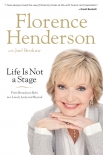Life Is Not a Stage by Florence Henderson (best self help books to read .txt) 📗

- Author: Florence Henderson
Book online «Life Is Not a Stage by Florence Henderson (best self help books to read .txt) 📗». Author Florence Henderson
I traveled to Australia to be part of Bob Hope’s All Star Comedy Special in 1978. We were to do a sketch together and there wasn’t much time for us to rehearse before going live in front of a huge audience. So we decided to do it in the car on the way to the venue. I learned from him how comedy was such a precise art. If I added an extra “the,” he’d stop me. He said, “You can’t do that. It has to be this, or we won’t get a laugh. It’s the rhythm of what you’re saying as well as what you’re saying.”
But the biggest insight he gave me was from literally watching him do nothing. It was summer in Australia, and it was very hot. I noticed in the backstage area that he was alone, sitting in the corridor quietly, all by himself.
“Bob, are you okay?” I asked him.
He nodded. “I just rest,” he explained. “It takes a lot of energy to do what we do. When I was in vaudeville, we’d do fourteen shows a day. The only way we had the energy to do it well was by making sure we had a few moments of rest. Don’t be burning up and wasting energy.”
That was an important lesson for me to heed. I was someone who never wanted to recognize my physical limitations. The galloping horse syndrome would always make me push myself beyond what anyone else would do, physically, emotionally, and every other way. It was timely information. I heard his voice loudly and clearly because I was obviously not taking care of myself in this regard, and there would soon be some serious consequences arising in its wake.
CHAPTER 19Cutting Through the Layers to the Truth
Anyone who has logged millions of miles in the air will have a catalog of phobia-inducing close calls (especially from the less technologically sophisticated days of the mid-twentieth century). During the Sound of Music tour, I was en route to Dallas when the plane started to vibrate excessively. It was fresh in everyone’s minds that another aircraft had recently blown apart due to the same circumstance. There were fire engines on the runway when we landed. I had Nanny and two of my children with me. Not a pleasant scenario.
Another time, I was returning to New York from an industrial show with Bill Hayes on one of the early commercial jets (probably a Boeing 707). JFK was fogged in. The pilot made two attempts to land but had to pull up each time. As the plane went around in circles, the pilot shut off the ventilation system to help conserve fuel and the cabin became stiflingly hot. Just as the fuel was almost at empty, conditions improved enough so we could land at Newark. It is statistically safer to go on a commercial plane than to drive your own car, but that fact fell on deaf ears. It is almost comical how the thought of being trapped inside an airplane that is about to crash was so energetically similar to how I perceived my stagnated personal life had become. All the responsibility with the four children, all the “what ifs,” combined with exhaustion and a feeling of being overwhelmed, created the perfect recipe. As this phobia increased in severity in the mid-1970s, I found myself more frequently turning job offers down because I didn’t want to fly.
The depletion and exhaustion during The Sound of Music caused me to suffer from stage fright as well, which grew progressively more difficult. Insomnia and my general lack of awareness about sound nutrition were also contributing factors that undermined my coping ability. During the Brady Bunch years, it was hardly a concern, because acting on film was far less taxing than being out on the road and performing constantly in front of live audiences.
Where this particular fear attached its tentacles was on the act of singing, which is the most demanding and required the most physical control of anything I did. Once I got out there and got the feel of the audience, I was usually fine, but prior to that I would be a wreck. I was a harsh critic of myself, a self-judgment that echoed the voice of my mother. Before going onstage, I concentrated hard to make sure I had command of my breath. Without it, you’re really in trouble. For example, when I did The Tonight Show, I never wanted to go out and do a slow ballad first. Instead, I’d do a very up-tempo song that would force me to stir up my energy and control my breath. Doing a slower number right after was never a problem.
The mind can be quite insidious in how it constructs coping mechanisms to make us feel superficially safer in the short term while deflecting or delaying dealing with the true root causes. But there comes a time when the bill has to be paid.
I had noticed the warning signs and beginning stages years before, but now the issues were inescapable. On the deepest level and despite all of my worldly success and hard work was the hardcore fact that my life was essentially tumbling out of control. The resulting fear had to go somewhere, and just to make sure that I’d pay attention, it had attached itself to the things I did the most: flying and performing.
This tremendous loss of confidence was probably rooted in my feeling of being trapped and my lack of courage to do anything about it. The questions I could ask myself were fairly obvious: You’re not happy and haven’t been that way for years. What’s the big





Comments (0)